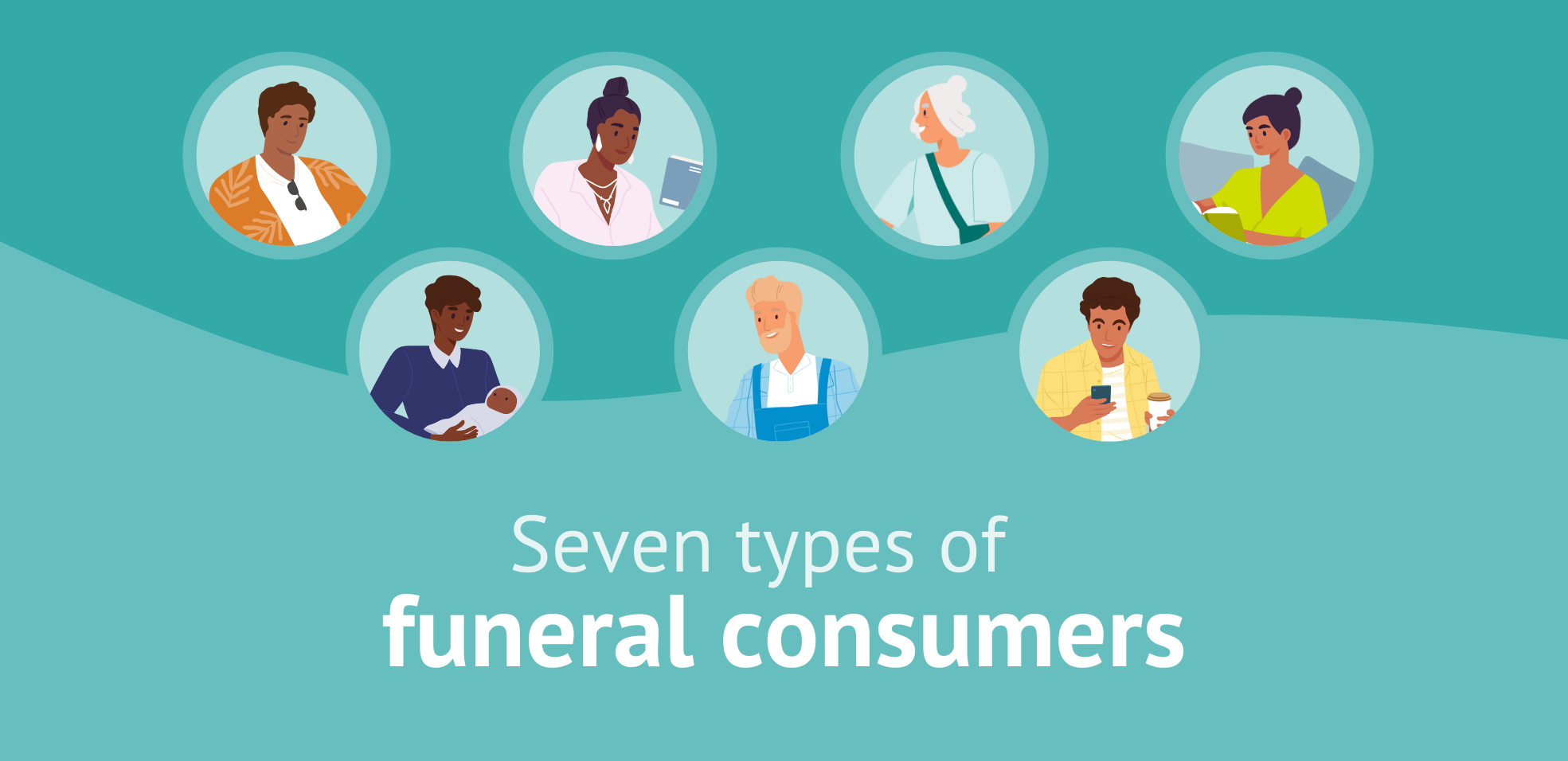Changing funeral consumers: Then vs. now
January 30, 2025

Have you noticed that the families you serve are changing?
Back in 2011, we saw that new technology, dispersed families, and shifting religious views all influenced social trends and family dynamics.
As a result, families had different attitudes, behaviors, and perceptions about funerals.
But how have funeral consumers changed from then to now?
Let’s explore different consumer segments and how they’ve evolved over the last 15 years!
Where we got the data: McKee Wallwork + Co Study
Consumer changes don’t happen overnight, but in 2011, some of the largest funeral homes in the nation began to wonder why their customers were so different from previous generations. They recognized that their target audience had changed but couldn't pinpoint how or why.
To better understand the shifts occurring in their markets, they hired McKee Wallwork + Co. (MW+C), a market research firm, to conduct the largest study ever on funeral consumer behaviors and preferences.
MW+C interviewed 3,000 individuals and asked them hundreds of questions to identify consumer preferences and trends. The study revealed six distinct consumer types, or "personas," in the market, which we’ll explore below.
⭐ Keep in mind that the market continues to evolve, and consumer preferences have changed since 2011. You can view the most current data from 2021 about 7 new types of funeral consumers, along with ways to connect with them in this blog. >>>
Funeral consumers from 2011 and how they've changed
Type 1: Pine-Boxers
Motivated by frugality and an emotionless process.
Pine-Boxers were likely to tell you something like, “Just bury me in the same pine box we put Dad in.” This group had a no-nonsense, matter-of-fact attitude toward funerals and did not bring much emotion into the planning process. Pine-Boxers were price-sensitive and wanted quick, simple solutions, but they preferred burial over cremation. Most identified as Christian but may not have been regular churchgoers.
How this group has changed
In 2011, this was the largest group making up 22.1% of funeral consumers. Their philosophy about wanting the most inexpensive options for funerals still rings true with newer consumer segments.
Learn more about today’s consumers in this blog.>>>
Type 2: Funeral Friends
Motivated by tradition and religion.
Funeral Friends were called “Funeral Friends” because more than any other type, they saw and understood the value of a funeral, a funeral home, and you. In fact, they were more likely to be loyal to a funeral home because of a personal relationship they had with the funeral director or owner. This group valued their interpersonal relationships and funerals, so this type was willing to spend more than any of the other consumer personas. They were very religious and attended church almost every week.
How this group has changed
In 2011, this group was the second largest, accounting for 20.6% of funeral consumers. Today, fewer segments are driven by religious beliefs or traditions. However, there is a new consumer segment called Faith & Family that shares a similar mindset to Funeral Friends.
Learn more about today’s consumers in this blog.>>>
Type 3: Polite Farewells
Motivated by etiquette and respect for the deceased.
Polite Farewells were predominantly female and likely to be married with children. They largely identified as Catholic and non-denominational/protestant Christian. The Polite Farewells preferred wine to beer, Ford to BMW, and JCPenny to J. Crew. Polite Farewells saw value in a funeral home and funeral director. Naturally caring, they often put the needs and desires of their family and friends before their own.
How this group has changed
This group made up 16.4% percent of funeral consumers in 2011. They’ve steadily declined over the years, but many of their philosophies around funerals are present in new consumer segments.
Learn more about today’s consumers in this blog.>>>
Type 4: Dead-enders
Motivated by the cheapest option for the deceased.
The Dead-Enders type was predominantly male, and most had never been married. About 53% considered themselves not religious, agnostic or atheist. This type thought that the funeral is for the deceased, not the living, so they’d rather not spend extra money since the deceased is already dead. They looked for the cheapest option available to them to dispose of the body and rarely saw a point to hold a ceremony for the living.
How this group has changed
In 2011, this group made up 13.8% of consumers and was starting to increase. Today, a similar funeral consumer segment, Distanced & Decided, has emerged that now accounts for 16% of funeral consumers. They share similar views about disposition preferences and services.
Learn more about today’s consumers in this blog.>>>
Type 5: Solo Secularists
Motivated by spirituality and eco-friendliness.
With this type, we started to see an obvious trend toward different preferences. This group was the most highly educated because the average person had a master’s or doctorate degree. They were conscious about the environment and often paid for environmentally friendly cremation options. Though not religious, they may have described themselves as “spiritual.” Ultimately, the Solo Secularist did not see a need for a funeral home or funeral. Instead, they were more likely to choose a direct cremation and throw a party to memorialize their loved one.
How this group has changed
The Solo Secularists experienced significant growth, rising from 12.1% to 18.43%, a 51% increase. Today, many in this group fall under the “Distanced & Decided” segment due to their preferences for environmentally friendly options, simple funerals, and convenient planning options.
Learn more about today’s consumers in this blog.>>>
Type 6: Click & Callers
Motivated by convenience and efficiency.
Click & Callers represented the biggest shift in buying preferences. Like others, this segment identified as non-denominational Christian and regularly attended church. They had respect for funeral homes but didn’t necessarily want a funeral director’s help. Instead, they preferred a do-it-yourself approach to planning and used the internet to find their answers. Due to this approach, the funerals they organized had many religious elements but were also highly customized.
How this group has changed
In 2011, Click & Callers made up 15.1% of consumers, and their numbers were increasing. Today, the do-it-yourself approach to funerals remains popular among several new consumer types, mainly the Resolute Rookies and Future Funerals.
Learn more about today’s consumers in this blog.>>>
Who are today's consumers?
A lot can change in a decade, and people's perceptions, attitudes, and interests are no exception. In 2021, MW+C conducted this study again with over 3,000 participants. After analyzing the data, the study revealed new consumer types entirely. Explore the 7 new consumer types and technology you can use to best serve them. >>>
Get access to the full report
We've analyzed the new data from 2021 and created a report that provides detailed information about each new consumer type, along with 5 key findings. Download the report here! 👇👇👇








